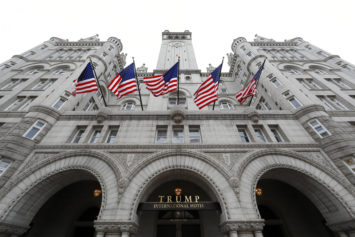Depending on whom you ask, you’ll likely get a diversity of responses when asking for a functional definition of our current Western notion of “economic aid.” While there are different types of aid, including medical, developmental, and humanitarian, to name a few, some believe it to be a wholly altruistic process designed to care for those in desperate need in countries about the globe. Others characterize it as a totally strategic and self-serving construct, a geostrategic method of exerting economic and political influence over a global network of dependent and less wealthy nations.
Apparently, the Trump administration, through its United Nations Ambassador Nikki Haley, has settled the debate. Consistent with its “America First” policy, Haley has insisted such aid to needy countries be contingent on whether those states vote with the United States on important international policy matters at the U.N. The push comes in the aftermath of the U.S. decision to cut millions in assistance to Palestinian refugees as a way of penalizing Palestine’s recent support for U.N. resolutions denouncing the Trump administration’s recognition of Jerusalem as Israel’s capital.
“It is the opinion of the U.S. mission to the U.N. that all U.S. foreign assistance should be reevaluated to ensure that taxpayers dollars are spent to advance U.S. interests, not to fund foreign legacy programs that provide little or no return on investment,” read a recent confidential internal memo drafted by Haley’s staff, as reported by ForeignPolicy.com. While the 53-page memo entitled “America First Foreign Assistance Policy” targeted education, energy, infrastructure and other development programs, it acknowledged that support for U.S. positions is not the only condition for aid and that the upgraded policy has to be selectively applied based on “US security or economic needs.”
The memo proposed a review of 40 nations that cast U.N. votes against the United States 54 percent of the time in 2016 while receiving a total of $100 million in assistance. It further highlighted that a top aid recipient like South Sudan “votes for U.S. interests at the United Nations a paltry 47.9% of the time” and that such currently funded projects like a school construction program in Ghana and a job training program in Zimbabwe be reconsidered. “None voted with us on Jerusalem, even though none have a strong domestic constituency compelling the vote,” read the memo.
“Clearly, it’s particularly cynical given people are in crisis,” offered Kwame Lyndon Wilburg, an organizer for the nonprofit Friends of the Congo and host of the diaspora-themed “Beyond Borders” radio show on WRFG Atlanta. “The use of that logic, one that says, ‘If you vote for me, you’re going to get aid,’ is damaging, and Haley and the Trump administration have clearly done that with particular events.”
Wilburg pointed to the administration’s current lack of action on such U.S. aid programs as Power Africa, the Obama administration’s signature African electrification initiative using monetary, technological and human assistance to galvanize private sector investment in power accessibility for African countries. “Not only has Trump shown little support for such initiatives continuing,” said Wilburg, but he can now “pull those programs where those countries do what they don’t want them to do. So what it means for Africans is that they are playing hardball.”
Such hardball tactics are consistent with Trump’s former position as a candidate where he was critical of foreign nations that didn’t fall in line while relying on American aid. They further jibe with his January 30 State of the Union speech where Trump appealed to “Congress to pass legislation to help ensure American foreign-assistance dollars always serve American interests, and only go to America’s friends. As we strengthen friendships around the world, we are also restoring clarity about our adversaries.”
“Of course, it’s a tortuous policy, since they often set up the conditions by which you need aid in the first place,” acknowledged Wilburg, given the skewed Western politics and “structural adjustment” policies that reinforce U.S. domination while leaving developing countries needy and dependent. “However, if the U.S. military sends a team of dentists and eye doctors to perform some kind of surgery for some villagers in Guyana, Jamaica or Ghana that immediately restores the quality of their lives, we would be hard put to tell them not to take the aid.”
Wilburg pointed to a number of innovative alternative approaches to the concept of aid already in effect in a number of places in the international realm, including the Petrocaribe energy co-op started in 2005 by late Venezuelan president Hugo Chavez to foster solidarity and self-sufficiency among Caribbean peoples and minimize Western influence in the region. In exchange for oil, Venezuela accepts payment in goods and services, and in affordable and deferred interest payments, from 19 member nations. With this ongoing program, members like the Dominican Republic and Cuba can reinvest savings from these affordable rates back into their home economies while paying a substantial portion of their oil imports off, respectively, in black beans and in medical and educational services.
In the Isangi District of the Democratic Republic of Congo, Samuel Yagase — weary of his struggling community’s dependency on the whimsical and ineffective aid of Western sources — founded the NGO GOVA (Group of Village Organizations for Self-Development), to leverage local resources and foster autonomous community development for a district of 600,000 Congolese. The successful program, now regarded an international model for communal self-sufficiency, prioritizes the utilization of local assets to serve, feed and sustain a large area of villages through such measures as getting each villager to commit the Congolese equivalent of 10 U.S. cents to the program.
“Everything was decided from outside without listening to local communities, without even respecting the locals,” recalled Yagase at a 2013 Nyumburu Cultural Center Lecture Series forum at the University of Maryland. The Congolese organizer and filmmaker characterized this reliance on foreign aid and control as “dangerous, not only for the Congo, but for the whole Africa.”
“We don’t want the foreign aid to replace us or work in our place,” stressed Yagase, noting, “We want the community to master its future. This is very, very crucial.”
While encouraged by such self-sufficient and forward-thinking alternatives to traditional Western aid polices, Wilburg noted how the U.S.-led West still manages to heavily influence Africa with even less aid. “Remember that as the U.S. is pulling back on its food, education and other assistance, it is ramping up its military assistance and presence on the continent,” Wilburg said of the active proliferation of AFRICOM, the U.S.-led military entity officially known as the United States Africa Command. Still, he recognized that “even AFRICOM had a medical and education assistance project.”
“So yes,” acknowledged Wilburg, “humanitarian aid can be used as a bit of a stick to get countries to cooperate with you.”

